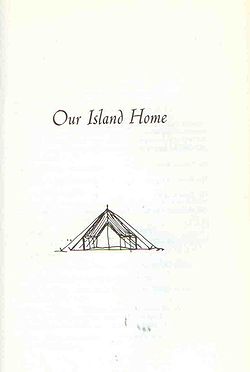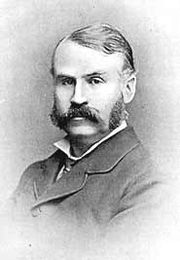
Our Island Home
Encyclopedia

German Reed Entertainment
German Reed Entertainment was founded in 1855 and operated by Thomas German Reed together with his wife, Priscilla Reed née Horton...
with a libretto by W. S. Gilbert
W. S. Gilbert
Sir William Schwenck Gilbert was an English dramatist, librettist, poet and illustrator best known for his fourteen comic operas produced in collaboration with the composer Sir Arthur Sullivan, of which the most famous include H.M.S...
and music by Thomas German Reed
Thomas German Reed
Thomas German Reed was an English composer and theatrical manager best known for creating the German Reed Entertainments, a genre of musical plays that made theatre-going respectable at a time when the stage was considered disreputable...
that premiered on June 20, 1870 at the Royal Gallery of Illustration
Royal Gallery of Illustration
The Royal Gallery of Illustration was a performance venue located at 14 Regent Street near Waterloo Place in London, in what was formerly the home of John Nash, designer of Regent Street, Regent's Park, and other urban improvements undertaken at the commission of George IV.From 1855 to about 1876,...
. The piece has five characters and is "biographical", in that the characters in the original production played themselves, except that they were given personalities opposite to their actual personalities.
Background
This work is the third in a series of six one-act musical plays written by Gilbert for Thomas German ReedThomas German Reed
Thomas German Reed was an English composer and theatrical manager best known for creating the German Reed Entertainments, a genre of musical plays that made theatre-going respectable at a time when the stage was considered disreputable...
and his wife Priscilla
Priscilla Horton
Priscilla Horton, later Priscilla German Reed , was a popular English singer and actress, known for her role as Ariel in W. C. Macready's production of The Tempest in 1838 and "fairy" burlesques at Covent Garden Theatre. Later, she was known, along with her husband, Thomas German Reed, for...
between 1869 and 1875. The German Reeds presented respectable, family-friendly musical entertainments
German Reed Entertainment
German Reed Entertainment was founded in 1855 and operated by Thomas German Reed together with his wife, Priscilla Reed née Horton...
at their Gallery of Illustration beginning in 1855, at a time when the theatre in Britain had gained a poor reputation as an unsavory institution and was not attended by much of the middle class. Shakespeare was played, but most of the entertainments consisted of poorly translated French operetta
Operetta
Operetta is a genre of light opera, light in terms both of music and subject matter. It is also closely related, in English-language works, to forms of musical theatre.-Origins:...
s, risque Victorian burlesques and incomprehensible broad farces.http://diamond.boisestate.edu/gas/books/bond/introduction.htm The Gallery of Illustration was a 500-seat theatre with a small stage that only allowed for four or five characters with accompaniment by a piano, harmonium and sometimes a harp.
Our Island Home takes its name from Alfred Tennyson's poem "The Lotos-Eaters". It is set on the shore of an island in the Indian Ocean
Indian Ocean
The Indian Ocean is the third largest of the world's oceanic divisions, covering approximately 20% of the water on the Earth's surface. It is bounded on the north by the Indian Subcontinent and Arabian Peninsula ; on the west by eastern Africa; on the east by Indochina, the Sunda Islands, and...
. German Reed had hoped that Arthur Sullivan
Arthur Sullivan
Sir Arthur Seymour Sullivan MVO was an English composer of Irish and Italian ancestry. He is best known for his series of 14 operatic collaborations with the dramatist W. S. Gilbert, including such enduring works as H.M.S. Pinafore, The Pirates of Penzance and The Mikado...
would set the music for the piece and had written to ask him. Sullivan requested a higher price than the Reeds could afford, and so Reed wrote the music himself.
This work introduced a number of the characters that Gilbert would use consistently in his later operas, including the overbearing, mature contralto and the meek, submissive baritone. Many of the elements in the piece are precursors to similar elements in Gilbert and Sullivan
Gilbert and Sullivan
Gilbert and Sullivan refers to the Victorian-era theatrical partnership of the librettist W. S. Gilbert and the composer Arthur Sullivan . The two men collaborated on fourteen comic operas between 1871 and 1896, of which H.M.S...
's famous 1879 opera, The Pirates of Penzance
The Pirates of Penzance
The Pirates of Penzance; or, The Slave of Duty is a comic opera in two acts, with music by Arthur Sullivan and libretto by W. S. Gilbert. The opera's official premiere was at the Fifth Avenue Theatre in New York City on 31 December 1879, where the show was well received by both audiences...
. The pirate "chief", Captain Bang, became the Pirate King in Pirates. Bang was also a precursor to the Frederic character, having been mistakenly apprenticed to a pirate band as a child by his deaf nursemaid. Similarly, Bang, like Frederic, has never seen a woman before. Also, he is affected by so keen a sense of duty as an apprenticed pirate that he is prepared to slaughter his own parents until the discovery of the passage of his twenty-first birthday frees him from his articles of indenture.
Captain Bang also exhibits elements of H.M.S. Pinafore
H.M.S. Pinafore
H.M.S. Pinafore; or, The Lass That Loved a Sailor is a comic opera in two acts, with music by Arthur Sullivan and a libretto by W. S. Gilbert. It opened at the Opera Comique in London, England, on 25 May 1878 and ran for 571 performances, which was the second-longest run of any musical...
s Captain Corcoran and Sir Joseph, rolled into one:
- I'm a hardy sailor, too;
- I've a vessel and a crew
- When it doesn't blow a gale
- I can reef a little sail.
- I never go below
- And I generally know
- The weather from the lee,
- And I'm never sick at sea.
The original performers in Our Island Home played themselves. However, in a typical Gilbertian twist, their personae were the opposite of those in real life. As they were personally known to many in their audiences, this was a very successful "in-joke".
Roles
- Priscilla German Reed (contraltoContraltoContralto is the deepest female classical singing voice, with the lowest tessitura, falling between tenor and mezzo-soprano. It typically ranges between the F below middle C to the second G above middle C , although at the extremes some voices can reach the E below middle C or the second B above...
) - Thomas German ReedThomas German ReedThomas German Reed was an English composer and theatrical manager best known for creating the German Reed Entertainments, a genre of musical plays that made theatre-going respectable at a time when the stage was considered disreputable...
(baritoneBaritoneBaritone is a type of male singing voice that lies between the bass and tenor voices. It is the most common male voice. Originally from the Greek , meaning deep sounding, music for this voice is typically written in the range from the second F below middle C to the F above middle C Baritone (or...
) - Fanny HollandFanny HollandFanny Holland was an English singer and comic actress primarily known as the creator of principal soprano roles in numerous German Reed Entertainments.-Life and career:...
(sopranoSopranoA soprano is a voice type with a vocal range from approximately middle C to "high A" in choral music, or to "soprano C" or higher in operatic music. In four-part chorale style harmony, the soprano takes the highest part, which usually encompasses the melody...
) - Arthur CecilArthur CecilArthur Cecil Blunt, better known as Arthur Cecil was an English actor, comedian, playwright and theatre manager. He is probably best remembered for playing the role of Box in the long-running production of Cox and Box, by Arthur Sullivan and F. C...
(tenorTenorThe tenor is a type of male singing voice and is the highest male voice within the modal register. The typical tenor voice lies between C3, the C one octave below middle C, to the A above middle C in choral music, and up to high C in solo work. The low extreme for tenors is roughly B2...
) - Captain Bang, A Pirate chief (R. Corney GrainRichard Corney GrainRichard Corney Grain , known by his stage name Corney Grain, was an entertainer and songwriter of the late Victorian era.-Biography:...
, later Edward (Alfred) Reed)
Synopsis

Ages Ago
Ages Ago is a musical entertainment with a libretto by W. S. Gilbert and music by Frederic Clay that premiered on 22 November 1869 at the Royal Gallery of Illustration. It marked the beginning of a seven year long collaboration between the two. The piece was revived many times, including at St...
for insisting on presenting the work every night on board the ship. The overbearing Mrs. Reed divides the island in quarters and, unfortunately, awards the only fertile part of the island to the despotic Mr. Cecil, who forces the others to rhyme or sing to him (and cook for him) in order to be fed. He also terrifies the others with his evil glance. Cecil has a soft life and everything he wants... except anchovy paste.
Fortunately, a cask washes up onshore filled with anchovy paste. The German Reeds strike a more equitable deal with Cecil: He gets the paste, and they switch sides on the island. Cecil's part of the island turns out to be made of solid gold. Just then, a ship arrives, and with it, the melodramatic Captain Bang: "Oh, tremble! I'm a Pirate Chief; Who comes upon me comes to grief." Bang explains that he is bound by his duty under his pirate indentures to execute his four new acquaintances. He explains his history:
- I was the only son of a kind indulgent father and a kind indulgent mother, whose only care was to gratify my smallest whim. On my seventh birthday my kind father asked me what I would like to be. I had always a hankering for a sea-life; at the same time I didn't want to leave them for long, for oh, I was an affectionate son. So I told them I should like to be a pilot. My kind papa consented and sent me with my nurse to the nearest sea-front, telling her to apprentice me to a pilot. The girl - a very good girl, but stupid - mistaking her instructions, apprenticed me to a pirate of her acquaintance and bound me over to serve him diligently and faithfully until I reached the age of twenty-one. We sailed that evening, and I have never seen my native land since.
German Reed recognizes Captain Bang as his long lost son. Nevertheless, Bang explains that by his articles of apprenticeship, he is bound to slaughter every prisoner he takes, and his indentures do not expire until the next day. However, based on the party's present longitude, it is determined that Bang has just turned 21. Bang agrees to take them all home on his ship.
Musical numbers
- 1. Carol - "Rise, pretty one, awaken" (Mr. Reed, Mrs. Reed and Miss Holland)
- 2. Duet - "Oh Mr. Cecil, Sir, how can you?" (Miss Holland and Mr. Cecil)
- 3. Trio - "Hurrah, a sail!" (Mrs. Reed, Miss Holland and Mr. Cecil)
- 4. Quartette - "Cask Catch"
- 5. Quartette - "Memorandum of agreement"
- 6. Song - "Oh, tremble! I'm a Pirate Chief" (Captain Bang)
- 7. Finale - "Hurrah, a sail!"
External links
- Our Island Home at the Gilbert and Sullivan Discography
- Online version of the text
- Introduction to autobiography of Jesse Bond

